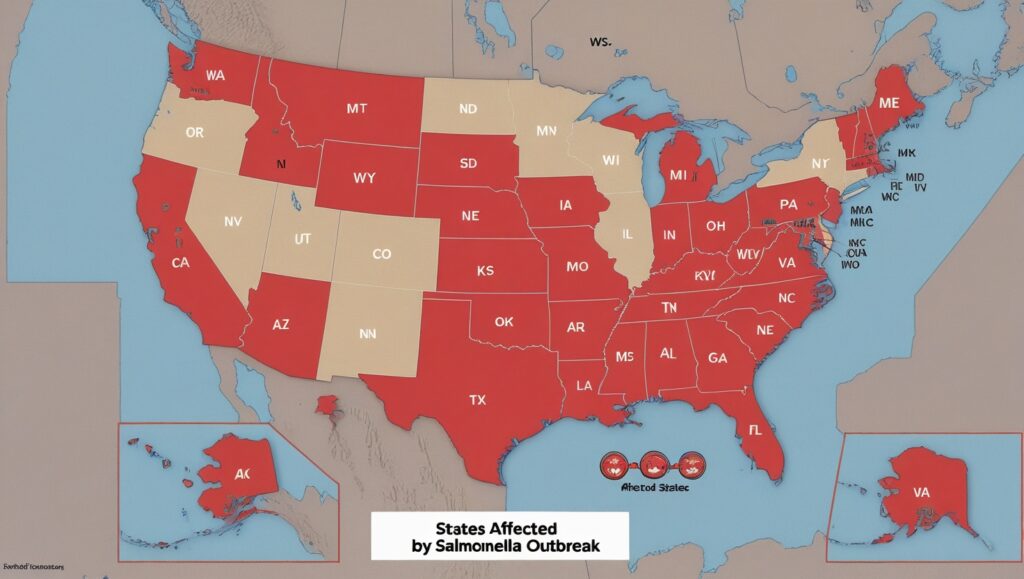A significant Salmonella outbreak has led to the recall of over 1.7 million eggs across multiple states, with 79 reported illnesses and 21 hospitalizations. This contamination represents one of the most serious food safety emergencies of 2025. Here’s everything you need to know to protect your family during this critical health crisis.
Understanding the Current Salmonella Outbreak
The ongoing contamination linked to brown eggs has become one of the most extensive food safety incidents of 2025. The U.S. Food and Drug Administration (FDA) has confirmed that this Salmonella outbreak affects products distributed across 24 states, making it crucial for consumers to check their refrigerators immediately as this crisis continues to spread.
Key Facts About This Food Safety Emergency
This bacterial contamination has created widespread concern with the following confirmed details:
- Affected Products: Over 1.7 million cartooned brown eggs linked to the contamination
- Distribution Period: February 3 to May 15, 2025
- Current Cases: 79 illnesses with 21 hospitalizations from the bacterial infection
- Geographic Scope: 24 states across the U.S. affected by the recall
- Latest Illness Onset: May 17, 2025
How to Identify Recalled Eggs from the Current Crisis
To determine if your eggs are part of this dangerous contamination, check for these specific identifiers that officials have linked to the Salmonella outbreak:
Plant Codes to Look For
During this health emergency, look for these critical markers:
- P-6562 or CA5330 printed on carton
- Julian dates: 32 through 126
- Sell-by dates: March 4 to June 19, 2025
Affected Retailers and States During the Recall
California and Nevada Stores Impacted by Contamination:
- Save Mart, Food Maxx, Lucky, Smart & Final
- Safeway, Radleys, Food 4 Less, Ralphs
- Sell-by dates: March 5 to June 4, 2025

Walmart Locations Affected by Recall (24 States): Alaska, Arizona, California, Colorado, Hawaii, Iowa, Idaho, Illinois, Indiana, Kansas, Michigan, Montana, North Dakota, Nebraska, New Mexico, Nevada, Ohio, Oklahoma, Oregon, South Dakota, Texas, Washington, Wisconsin, Wyoming
Complete List of Recalled Egg Brands from the Contamination
The following brands have been identified as part of this serious bacterial infection:
Organic and Cage-Free Varieties Affected by Recall
- Clover Organic Large Brown (12 eggs) – UPC: 070852010427
- O Organics Cage Free Large Brown (6 eggs) – UPC: 079893401522
- O Organics Large Brown (12 & 18 eggs) – UPC: 079893401508, 079893401546
- Marketside Organic Large Cage Free Brown (12 & 18 eggs)
- Raley’s Organic Large Cage Free Brown (12 & 18 eggs)
- Sun Harvest Organic Cage Free Large Brown (12 & 18 eggs)
- Sunnyside Organic Cage Free Large Brown (12 & 18 eggs)
Standard Cage-Free Options Linked to Contamination
- First Street Cage Free Large Brown (150 eggs) – UPC: 041512039638
- Nulaid Medium/Jumbo Brown Cage Free (12 eggs)
- Simple Truth Large/Medium Brown Cage Free (18 eggs)
- Sunnyside Large Brown Cage Free (12 & 18 eggs)
Health Risks and Salmonella Outbreak Symptoms
This bacterial infection has caused serious health complications that can lead to severe medical issues. Understanding contamination symptoms is crucial for early detection. Watch for these symptoms during this health crisis, which typically appear 6 hours to 6 days after exposure:
Common Bacterial Infection Symptoms
- Diarrhea (sometimes bloody)
- Stomach cramps and abdominal pain
- Fever and chills
- Headache
- Nausea and vomiting
- Loss of appetite
- Fatigue
High-Risk Individuals During This Health Crisis
The bacterial contamination poses greater risks to:
- Adults over 65
- Children under 5
- Pregnant women
- Immunocompromised individuals
- People with chronic conditions
Immediate Safety Steps During This Food Crisis
If You Have Eggs Linked to the Recall
- Do NOT consume any eggs matching the recall criteria
- Dispose of immediately or return to store for full refund
- Clean and sanitize all surfaces that contacted contaminated eggs
- Wash hands thoroughly with soap and warm water
Prevention During This Health Emergency
- Check all egg cartons against recall information
- Cook eggs to internal temperature of 160°F
- Avoid cross-contamination in kitchen during this crisis
- Store eggs properly in refrigerator
When to Seek Medical Attention During the Salmonella Outbreak
Contact healthcare providers immediately if you experience contamination-related symptoms such as:
- Severe dehydration
- High fever (over 101.3°F)
- Bloody diarrhea
- Signs of bacteremia (infection spreading to bloodstream)
- Symptoms lasting more than a week
Latest Updates on the Investigation
The FDA continues investigating this contamination incident with support from the CDC and state health departments. While the latest illness onset from this bacterial infection was May 17, 2025, officials warn that more cases may emerge due to reporting delays.
Ongoing Health Crisis Monitoring
- Real-time case tracking across states affected by the contamination
- Enhanced testing of egg production facilities connected to the recall
- Coordination with retail partners for complete product removal from this crisis
Protecting Your Family During This Health Emergency
Kitchen Safety Protocol During the Crisis
- Verify egg safety before use during this contamination
- Cook thoroughly – no runny yolks or whites
- Separate raw and cooked foods
- Clean surfaces with bleach solution
- Refrigerate promptly at 40°F or below
For Food Service Establishments During the Recall
Restaurants and food service providers should immediately check inventory and remove any products matching the recall criteria to prevent further spread of this bacterial infection.
Contact Information and Resources for the Salmonella Outbreak
For Recall Questions: August Egg Company: 1-800-710-2554 (9 AM – 5 PM PT)
For Health Concerns: Contact your healthcare provider or local health department
For Latest Updates: Monitor FDA and CDC websites for additional recall information
Official Government Resources
- FDA Food Safety Alerts: FDA.gov Food Safety
- CDC Outbreak Investigations: CDC Foodborne Outbreaks
- USDA Food Safety Guidelines: FoodSafety.gov
- State Health Department Directory: CDC State Health Departments
Food Safety Education Resources
- Safe Food Handling Tips: Partnership for Food Safety Education
- Salmonella Prevention Guide: Mayo Clinic Food Safety
- Kitchen Safety Best Practices: USDA Food Safety and Inspection Service
Emergency Health Information
- Poison Control Center: American Association of Poison Control Centers or call 1-800-222-1222
- Find Local Healthcare Providers: HealthCare.gov Provider Directory
- Food Poisoning Symptoms Guide: WebMD Food Poisoning
Conclusion: Staying Safe During the Crisis
This health emergency serves as a critical reminder of food safety importance. By checking your eggs immediately, following proper food handling procedures, and staying informed about recall updates, you can protect your family from this serious Salmonella outbreak health threat.
Remember: When in doubt about any egg products during this crisis, it’s better to dispose of them safely than risk illness. The financial loss of discarded eggs is minimal compared to potential healthcare costs and suffering from bacterial infection.
Stay vigilant, check your refrigerator now, and share this information with friends and family to help prevent further spread of contamination from this ongoing health emergency.
FAQs About the Salmonella Outbreak
What is the Salmonella outbreak and how many people are affected?
The current Salmonella outbreak is linked to contaminated brown eggs and has resulted in 79 confirmed illnesses across 24 states, with 21 people requiring hospitalization. This bacterial infection outbreak began with cases dating back to February 2025, with the most recent illness onset reported on May 17, 2025. The contamination has prompted the recall of over 1.7 million eggs distributed nationwide.
How can I tell if my eggs are part of the Salmonella outbreak recall?
To identify eggs affected by the Salmonella outbreak, check your egg cartons for plant codes P-6562 or CA5330, along with Julian dates ranging from 32 to 126. The sell-by dates for recalled eggs range from March 4 to June 19, 2025. If your eggs match these identifiers, they are part of the contaminated batch linked to this bacterial infection outbreak.
What are the symptoms of illness from this Salmonella outbreak?
Symptoms from this Salmonella outbreak typically appear 6 hours to 6 days after consuming contaminated eggs and include diarrhea (sometimes bloody), stomach cramps, fever, headache, nausea, vomiting, and fatigue. High-risk individuals such as adults over 65, children under 5, pregnant women, and immunocompromised people may experience more severe complications from this bacterial infection.
What should I do if I have eggs from the Salmonella outbreak recall?
If you have eggs linked to the Salmonella outbreak, do not consume them under any circumstances. Immediately dispose of the eggs or return them to the store for a full refund. Thoroughly clean and sanitize all surfaces that may have contacted the contaminated eggs, and wash your hands with soap and warm water to prevent further spread of the bacterial infection.
Which stores and states are affected by the Salmonella outbreak egg recall?
The Salmonella outbreak has affected eggs sold at major retailers across 24 states. Walmart locations in Alaska, Arizona, California, Colorado, Hawaii, and 19 other states have recalled contaminated eggs. California and Nevada stores including Save Mart, Safeway, Raleys, and Smart & Final are also impacted. The bacterial contamination spans a wide geographic area, making it crucial for consumers nationwide to check their egg supplies.

